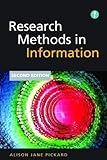Research methods in information / Alison Jane Pickard ; with contributions from Sue Childs [and others].
Material type: Computer fileLondon : Facet, 2013Edition: Second editionDescription: 1 online resource (xxii, 361 pages) : digital, PDF file(s)Content type:
Computer fileLondon : Facet, 2013Edition: Second editionDescription: 1 online resource (xxii, 361 pages) : digital, PDF file(s)Content type: - text
- computer
- online resource
- 9781783300235 (ebook)
- 20.72
- Z669.7 .P53 2013
| Item type | Current library | Call number | URL | Status | Barcode | |
|---|---|---|---|---|---|---|
 E-Book
E-Book
|
Ranganathan Library | 20.72 (Browse shelf(Opens below)) | Link to resource | Available | E01948 |
Browsing Ranganathan Library shelves Close shelf browser (Hides shelf browser)
Title from publisher's bibliographic system (viewed on 05 Jul 2018).
Introduction -- Setting the content -- The research hierarchy -- Overview of contents -- Part 1 Starting the research process -- Major research paradigms -- Introduction -- Positivist research -- Postpositivism and mixed methods research (MMR) -- Interpretivist research -- Qualitative or quantitative methodology? -- Qualitative research design -- Quantitative research design -- Mixed methods research -- Criteria for judging research -- Establishing trustworthiness in qualitative research -- Establishing rigour in quantitative research -- Summary -- Practical exercise -- Suggested further reading -- Reviewing literature -- Introduction -- Information searching and retrieval -- Evaluation -- Critical analysis -- Synthesizing the research: developing a theoretical framework -- Summary -- Practical exercise -- Suggested further reading -- Defining the research -- Introduction -- Designing a conceptual framework -- The research hypothesis -- Research aims and objectives -- Summary -- Practical exercise -- Suggested further reading -- The research proposal -- Why write a proposal? -- Structure of a research proposal -- The proposal as a research framework -- Summary -- Practical exercise -- Suggested further reading -- Sampling -- Why sample? -- Population and sample -- Probability sampling -- Purposive sampling -- Summary -- Practical exercise -- Suggested further reading -- Research data management -- Ethics in research -- Introduction -- Gaining access to the field -- Informed consent -- Anonymity and confidentiality? -- Protecting participants -- Ethics online -- Summary -- Practical exercise -- Suggested further reading.;Part 2 Research methods -- Case studies -- Introduction -- Phases in case study research -- Summary -- Practical exercise -- Suggested further reading -- Surveys -- Introduction -- Descriptive surveys -- Explanatory surveys -- The survey process -- Summary -- Practical exercise -- Suggested further reading -- Experimental research -- Introduction -- The nature of causality -- The true experiment -- Quasi-experimental design: the 'effects study' -- Summary -- Practical exercise -- Suggested further reading -- Usability testing -- Introduction -- Quasi experimental usability studies -- Cognitive walkthroughs -- Heuristic evaluation -- Ethnography -- Introduction -- Components of ethnographic study -- Virtual ethnography -- Ethics in ethnography -- Summary -- Practical exercise -- Suggested further reading -- Delphi study -- Introduction -- The Delphi process -- Rules of a Delphi study -- Modifying a Delphi study -- Delphi studies and new technologies -- Summary -- Practical exercise -- Suggested further reading -- Action research -- Introduction -- The action research cycle -- Trustworthiness in action research -- Action research as reflective practice -- Summary -- Practical exercise -- Suggested further reading -- Historical research -- Introduction -- The research process -- Summary -- Practical exercise -- Suggested further reading -- Grounded theory: method or analysis? -- Introduction -- Defining grounded theory -- Summary -- Practical exercise -- Suggested further reading.;Part 3 Data collection techniques -- Interviews -- Introduction -- What is the purpose of an interview? -- The seven stages of the interview process -- Online interviewing -- Summary -- Practical exercise -- Suggested further reading -- Questionnaires -- Introduction -- Designing questionnaires -- Developing questions -- Scale items -- Forms of questionnaire -- Summary -- Practical exercise -- Suggested further reading -- Observation -- Introduction -- The role of the observer -- Recording what you see: going with signposts -- Summary -- Practical exercise -- Suggested further reading -- Diaries -- Introduction -- The purpose of diaries in research -- Participant diaries -- The researcher's log -- Structure and recording -- Summary -- Practical exercise -- Suggested further reading -- Focus groups -- Introduction -- The purpose of a focus group -- Organizing a focus group -- Online focus groups -- Summary -- Practical exercise -- Suggested further reading -- Analysis of existing, extnernally created material -- The different supporting roles of documents -- LIS research principally based on documents -- Citation analysis -- Logs associated with computer software and the use of ICT.;Part 4 Data analysis and research presentation -- Qualitative analysis -- Introduction -- Phenomenological strategies -- Ethnographic methods -- Narrative and discourse analysis -- Constant comparative analysis -- Memo writing -- Presenting qualitative findings -- Software for qualitative analysis -- Summary -- Practical exercise -- Suggested further reading -- Quantitative analysis -- Introduction -- Levels of measurement -- Frequency distribution -- Cross-tabulation -- Measures of central tendency -- Measures of dispersion -- Correlation -- Displaying data -- Testing for statistical significance -- Software for quantitative analysis -- Summary -- Practical exercise -- Suggested further reading -- Presenting the research -- Introduction -- Planning the final report -- Form and structure -- Summary -- Suggested further reading -- Glossary and references.
The long-awaited 2nd edition of this best-selling research methods handbook is fully updated and includes brand new coverage of online research methods and techniques, mixed methodology and qualitative analysis. This edition includes two new contributed chapters: Professor Julie McLeod, Sue Childs and Elizabeth Lomas focus on research data management, applying evidence from the recent JISC funded 'DATUM' project; Dr Andrew Shenton examines strategies for analysing existing documents.
There are no comments on this title.







